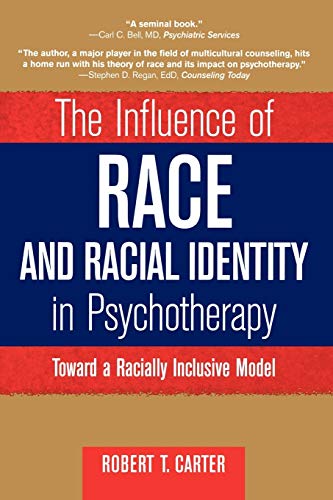The Influence of Race and Racial Identity in Psychotherapy
Toward a Racially Inclusive Model
Robert T. Carter
BOOK REVIEW

Understanding the complex tapestry of race and racial identity in psychotherapy is no simple feat, yet Robert T. Carter's groundbreaking work, The Influence of Race and Racial Identity in Psychotherapy: Toward a Racially Inclusive Model, dives deep into this vital conversation with both fervor and precision. This book is not merely an academic exploration; it is an urgent call to action for mental health professionals and society alike, demanding that we confront the uncomfortable realities of race and its profound effects on therapy.
Set against the backdrop of a society grappling with racial tensions, Carter's book, published in 1998, carved out its influence in a field that often overlooks the implications of race in therapeutic environments. The prevailing narrative at the time tended to sidestep the rich, intricate layers of racial identity, opting instead for a one-size-fits-all model that left many feeling unheard and unseen. With his compelling prose, Carter challenges readers to acknowledge how race shapes the therapeutic alliance and influences clients' experiences.
This isn't just a scholarly text; it's a manifesto demanding that we reimagine our therapeutic frameworks. Carter implores us to move away from the sterile, homogenized view of psychotherapy and embrace a more nuanced understanding that is inclusive of diverse racial identities. His argument is compelling: understanding a client's racial identity is not an optional aspect of therapy but a fundamental prerequisite to effective practice.
The richness of Carter's work lies in its ability to evoke strong emotional responses. Clients, often members of marginalized communities, bring their lived experiences into the therapeutic space. Ignoring race is akin to blindfolding oneself in a dark room and stumbling around. It's time to remove those blindfolds. Carter's insights challenge mental health professionals to reflect on their biases and the historical context that informs their practices, ultimately fostering a more informed, compassionate approach that resonates deeply with clients.
Readers have offered a myriad of opinions about Carter's book, demonstrating its impact across the mental health community. While some hailed it as a transformative piece that restructured their approach to therapy, others questioned whether the ideas presented could be realistically implemented in mainstream practices. Critiques often center around the tension between theory and practice. Can a racially inclusive model be fully realized in entrenched systems that have historically marginalized certain voices? It's a question that both believers and skeptics grapple with.
Yet, what's undisputed is the crucial dialogue that Carter ignites, pushing readers toward introspection and growth. Commentators often highlight how his work inspires mental health practitioners to transcend their initial training and enrich their understanding by engaging with cultural, sociopolitical, and psychological complexities surrounding race. The ramifications are profound: therapists equipped with this knowledge may forge deeper connections with their clients, ultimately leading to more effective healing journeys.
The historical context in which Carter wrote this text is equally significant. The late 1990s saw a burgeoning rise in multicultural psychology, a movement that sought to highlight and elevate diverse perspectives within psychology. In this light, Carter's work stands as a pivotal text, contributing to the academic and professional discourse surrounding race in psychotherapy. His insights have laid the groundwork for subsequent studies and practices that further examine and advocate for racial inclusivity.
As therapy continues to evolve, grappling with newer societal dynamics around race, Carter's work remains exceptionally relevant. It serves as a haunting reminder that race cannot - and should not - be sidelined in therapeutic settings. Those who miss this critical lesson risk encountering a barrier to understanding that could result in devastating consequences for the clients they serve.
In a world where silence often prevails in the face of uncomfortable conversations about race, The Influence of Race and Racial Identity in Psychotherapy stands as a beacon of hope and change. It commands that you, dear reader, confront your biases, broaden your knowledge, and embrace the transformative potential of a racially inclusive therapeutic model. The future of psychotherapy necessitates this evolution, urging us all to illuminate the shadowy corners of our biases and step into a more equitable realm of mental health care. The time for change is now. ☄️
📖 The Influence of Race and Racial Identity in Psychotherapy: Toward a Racially Inclusive Model
✍ by Robert T. Carter
🧾 320 pages
1998
#influence #race #racial #identity #psychotherapy #toward #racially #inclusive #model #robert #carter #RobertTCarter